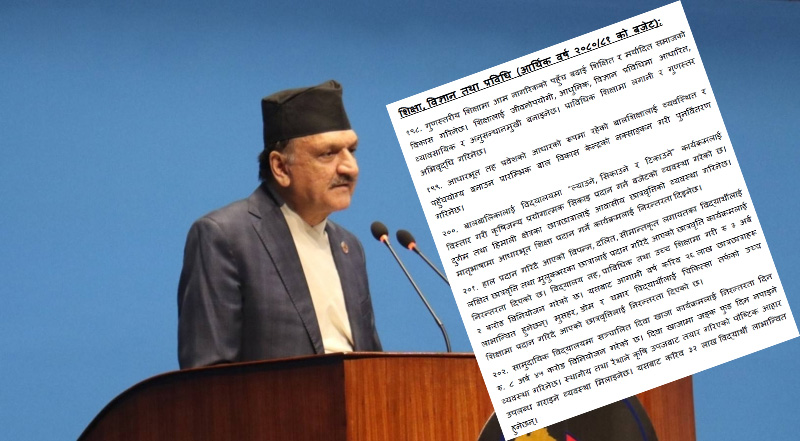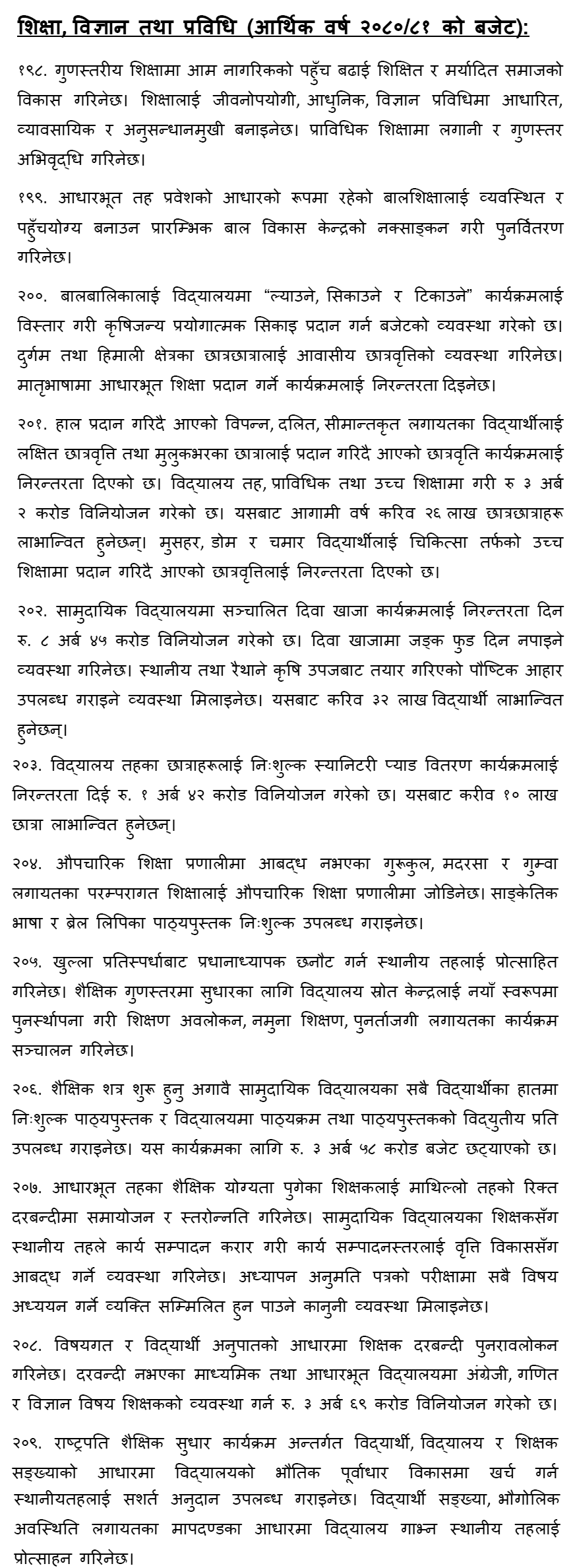
Education, Science, and Technology Budget for FY 2080/81 - Nepal Government
198. An educated and dignified society will be developed by increasing the access of common citizens to quality education. Education will be made vital, modern, science and technology based, professional and research oriented. Investment and quality in technical education will be enhanced.
199. Primary Child Development Centers will be mapped and redistributed to make early childhood education, which forms the basis of basic level entry, systematic and accessible.
200. Budgeted to expand the “Bring, Learn and Sustain” program for children in schools to provide experiential agricultural learning. Residential scholarships will be arranged for students from remote and Himalayan areas. The program of providing basic education in the mother tongue will be continued.
201. It has continued the scholarship program which is currently being provided to the underprivileged, Dalit, marginalized and other students and the scholarship program which is being provided to female students across the country. Rs 3.2 billion has been allocated for school level, technical and higher education. About 2.6 million students will benefit from this in the coming year. It has continued to provide scholarships to Musahar, Dom and Chamar students for higher education in medicine.
202. To continue the midday meal program in community schools, Rs. 8 billion 45 crore has been allocated. It will be arranged that no junk food will be given in the midday meal. Arrangements will be made to provide nutritious food prepared from local and regional agricultural produce. Around 32 lakh students will benefit from this.
203. By continuing the free sanitary pad distribution program to school girls, Rs. 1 billion 42 crore has been allocated. About 1 million girl students will benefit from this.
204. Traditional education, including Gurukul, Madrasa and Gumwa, which are not affiliated to the formal education system, will be integrated into the formal education system. Sign language and Braille textbooks will be provided free of charge.
205. The local level will be encouraged to choose the principal through open competition. In order to improve the educational quality, the school resource center will be restored in a new form and programs such as teaching observation, model teaching, and refresher programs will be conducted.
206. Before the start of the academic session, free textbooks will be provided to all students in public schools and electronic copies of the syllabus and textbooks will be provided in schools. For this program Rs. 3.58 billion budget has been allocated.
207. Teachers who have attained the basic level educational qualification will be adjusted and promoted to the upper level vacant posts. Arrangements will be made to link the level of work performance with professional development by making a contract with the community school teachers. A legal arrangement will be made to allow people studying all subjects to participate in the teaching permit examination.
208. Teacher posts will be reviewed on the basis of subject and student ratio. To provide teachers for English, Mathematics and Science subjects in secondary and basic schools without Darwandi, Rs. 3.69 billion has been allocated.
209. Under the President's Educational Reform Program, conditional grants will be provided to local governments to spend on physical infrastructure development of schools based on the number of students, schools and teachers. The local level will be encouraged to merge schools based on criteria such as the number of students, geographical location, etc.
210. By adopting the operational modality of Budhanilkanth School in Kathmandu and Gandaki Boarding School in Pokhara, the feasibility study and pre-preparation work will be carried out for the establishment of one model residential community school in Dhankuta, Bardibas, Tansen, Surkhet and Dadeldhura through the educational group.
211. The rest of the post-earthquake reconstruction of the school building will be completed next year. The budget has been allocated for the reconstruction of the historic Trichandra College. The reconstruction process of 38 campuses damaged by the earthquake, including Mahendra Ratna Campus, will be taken forward.
212. Access to technical and vocational education will be expanded at all local levels. The technical schools under the Technical Education and Vocational Training Council will be transferred to be operated by the state government. The Technical Education and Vocational Training Council will be focused on skills testing, technical education curriculum development, quality and standard setting.
213. Students who have obtained higher education on scholarship in technical subjects will be mobilized to serve two years in community educational institutions or local level.
214. Based on the self-declaration of having learned skills at home and abroad, arrangements will be made to test and certify the skills of manpower. A technical instructor permit system will be implemented to enhance the efficiency of technical instructors. Through the Technical Education and Vocational Training Council, the skills of 50,000 people will be tested and certified in the coming financial year.
215. The University Grants Commission will be restructured and strengthened to focus on the regulation of higher education, quality assurance and accreditation, national aptitude test and standard setting, and recognition and equivalence of educational qualifications. Arrangements will be made to provide grants to universities based on criteria such as academic results, teaching and learning activities, resource mobilization, etc. The annual academic calendar of the university will be strictly monitored by the University Grants Commission.
216. Madan Bhandari Science and Technology University and Yogamaya Ayurvedic University will be brought into operation. The process of drafting a law related to Nepal University will be taken forward.
217. Funds have been allocated to advance the construction of medical colleges in Butwal of Lumbini Province, Vardiwas of Madhesh Province and Surkhet of Karnali Province.
The process of operating the said medical colleges will be taken forward in collaboration with the respective provincial hospitals. Necessary budget has been allocated for running a medical college in Dadeldhura.
218. Keshar Library, National Library and Dilliraman Kalyani Regmi Memorial Library will be strengthened and books digitized. Provincial and local levels will be encouraged to establish, operate and manage community libraries.
219. To make higher education research-oriented, the budget has been allocated for capacity development of SEDA, SERID and SINAS under Tribhuvan University.
220. A Federal Education Act will be formulated to organize school education, higher education, technical and vocational education and skill development training and national qualification format in accordance with the constitutional provisions.
221. The thinking and activity of research and innovation will be developed from the school level in science, technology, engineering, art, mathematics and other subjects.
222. Necessary preparations will be made to establish a regulatory agency for the safe use, management, regulation and monitoring of radioactive materials. Necessary legal arrangements will be made for the safe use, regulation and management of chemical substances.
223. To the Ministry of Education, Science and Technology Rs. 1 trillion 97 billion 29 crore has been allocated.
Highlights:
|






